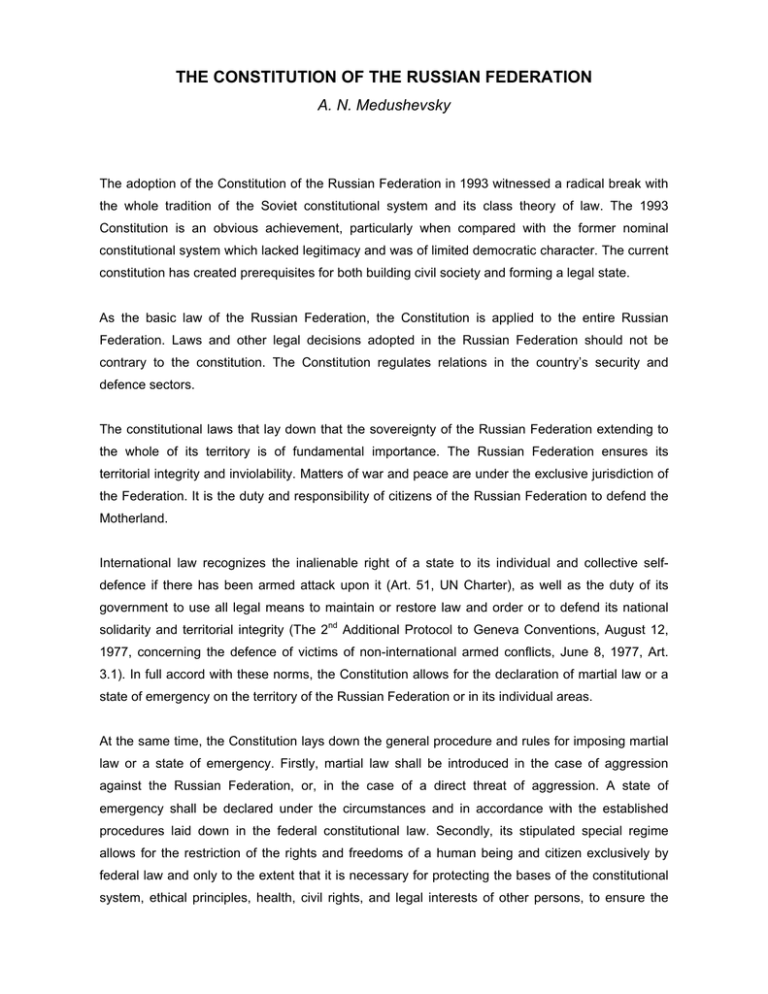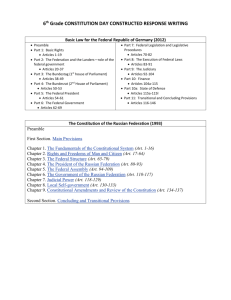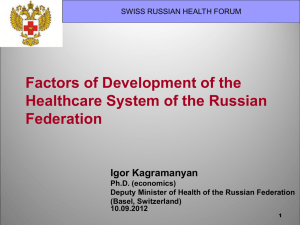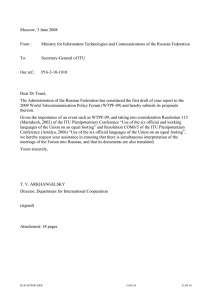THE CONSTITUTION OF THE RUSSIAN FEDERATION A. N. Medushevsky
advertisement

THE CONSTITUTION OF THE RUSSIAN FEDERATION A. N. Medushevsky The adoption of the Constitution of the Russian Federation in 1993 witnessed a radical break with the whole tradition of the Soviet constitutional system and its class theory of law. The 1993 Constitution is an obvious achievement, particularly when compared with the former nominal constitutional system which lacked legitimacy and was of limited democratic character. The current constitution has created prerequisites for both building civil society and forming a legal state. As the basic law of the Russian Federation, the Constitution is applied to the entire Russian Federation. Laws and other legal decisions adopted in the Russian Federation should not be contrary to the constitution. The Constitution regulates relations in the country’s security and defence sectors. The constitutional laws that lay down that the sovereignty of the Russian Federation extending to the whole of its territory is of fundamental importance. The Russian Federation ensures its territorial integrity and inviolability. Matters of war and peace are under the exclusive jurisdiction of the Federation. It is the duty and responsibility of citizens of the Russian Federation to defend the Motherland. International law recognizes the inalienable right of a state to its individual and collective selfdefence if there has been armed attack upon it (Art. 51, UN Charter), as well as the duty of its government to use all legal means to maintain or restore law and order or to defend its national solidarity and territorial integrity (The 2nd Additional Protocol to Geneva Conventions, August 12, 1977, concerning the defence of victims of non-international armed conflicts, June 8, 1977, Art. 3.1). In full accord with these norms, the Constitution allows for the declaration of martial law or a state of emergency on the territory of the Russian Federation or in its individual areas. At the same time, the Constitution lays down the general procedure and rules for imposing martial law or a state of emergency. Firstly, martial law shall be introduced in the case of aggression against the Russian Federation, or, in the case of a direct threat of aggression. A state of emergency shall be declared under the circumstances and in accordance with the established procedures laid down in the federal constitutional law. Secondly, its stipulated special regime allows for the restriction of the rights and freedoms of a human being and citizen exclusively by federal law and only to the extent that it is necessary for protecting the bases of the constitutional system, ethical principles, health, civil rights, and legal interests of other persons, to ensure the defence of the country and its security. Thirdly, martial law or a state of emergency shall be declared by the President of the Russian Federation, who shall immediately notify the Council of Federation and the State Duma about this. However, it is not evident from the Constitution that the refusal of the Council of Federation to approve the appropriate decree of the President automatically involves the lifting of martial law or a state of emergency. If the President imposes a state of emergency, a relevant federal constitution may set down some restrictions of rights and freedoms with the limits and duration indicated, but if the state of emergency is not declared, the rights and freedoms may be limited by the federal law sine die. This provides the feasibility of implementing all measures against the state of emergency without its unofficial declaration. The President, therefore, has dormant powers implicit in the Constitution, which may be applied via a broad interpretation of his powers. Many experts note, for good reason, that the Constitution gives excessive, almost absolute, centralization and concentration of powers in the military sphere to the President. At the same time, the Constitution lays down the positions implying the division of military powers amongst different branches and levels of power. Thus, to decide whether the Armed Forces of the Russian Federation may be used outside its territory is within the competence of the Council of Federation. The Government of the Russian Federation shall carry out measures to ensure the defence of state security. The Constitution stipulates that defence and security, the defence industry, the determination of a procedure for selling and purchasing arms, ammunition, military equipment, and other military property, the definition of the status and defence of the state boundary are under the jurisdiction of the Russian Federation. At the same time, it lays down that federal executive bodies may transfer a part of their powers to the subjects of the Federation. In the Russian Federation, a human being, his/her rights and freedoms are supreme values. The duties of the state are to recognize, observe, and protect the rights and freedoms of man and citizen. This fundamental principle of state building is also under way in the military sphere. The Constitution provides that a citizen of the Russian Federation shall do his military service in accordance with the federal law. At the same time, it allows for the replacement of military service by an alternative civilian service if his military service runs counter to a citizen’s beliefs or faiths, as well as in other circumstances established by federal cases. Until recently, this norm has been practically inactive and this right could not have been asserted in court in view of the absence of a federal law on alternative military service. The current Russian Constitution is the expression of social compromise in a society split by confrontations between democracy and authoritarianism. Its provisions, including those concerning the military sphere, are formalized and developed in federal law, and most of them are presented in the present Collection.






